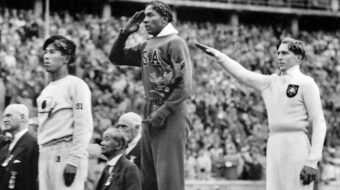
I recently circulated a petition calling for action by the Federation of International Football Associations (FIFA), the world’s leading soccer organization, to suspend the Croatian national soccer team from the upcoming World Cup games in Brazil because of the team’s use of World War II Croatian fascist slogans, and I implored readers to support the petition.
There is another story concerning Croatia’s role in World War II which has gotten significant coverage in France: People claiming to be representatives of the Croatian community in France, or “Croats Residing in France” as they call themselves, have sued Bob Dylan, whose songs of social criticism, beginning with “Masters of War,” “Blowin’ in the Wind” and “The Times They Are a-Changin’,” have made him one of the best known and admired American artists of the last 50 years.
Below is a Croatian press report, and below that are my own comments. This case makes an interesting subtext to the incitement by the Croatian national football team. In both cases, that of the defenders of the football team and that of Dylan’s attackers, there is an obvious desire to either celebrate or deny a barbarous past, to make sure that “the times they are not a-changin’.”
Croat association in France has announced it will file a lawsuit against Bob Dylan for making offensive comments about Croats in Rolling Stone magazine.
Vecernji List, BIRN
Zagreb
The Council of Croats in France, CRICCF, has decided to file a lawsuit against the US singer and songwriter for making what they call “deeply offensive” comments against Croats.
“CRICCF decided on its extraordinary session held this week to file criminal charges against Robert Allen Zimmerman aka Bob Dylan and the French publisher of Rolling Stone magazine for inciting racism and hatred against Croats and the Croatian people,” Vlatko Maric, Secretary General of the Council, told the Croatian daily Vecernji List.
In September [2012], Dylan ruffled feathers in Croatia by comparing Croats to American whites and German Nazis in the course of a discourse on US politics in Rolling Stone magazine.
Commenting on still tense relations between African Americans and whites, Dylan said:
“If you’ve got a slave master or the [Klu Klux] Klan in your blood, blacks can sense that … Just like Jews can sense Nazi blood and the Serbs can sense Croatian blood.”
Maric added that Dylan was “without any doubt inciting hatred against Croatians.”
The comment about Croats has caused numerous comments on websites that published the interview, prompting some to accuse the musician of not knowing much about history and politics in the Balkans.
Some radio stations in Croatia, including Radio Split, banned his songs from its play list.
Dylan held two concerts in Belgrade, one in 1991 and the other one in 2010. Two years ago, Dylan also had a concert in Zagreb.
My response:
While Dylan’s use of “blood” is very inappropriate, since all human blood is the same, that of black and white people, Jews and gentiles, and the two South Slavic nationalities, Croatians and Serbians, and Dylan would have been much better off saying “Ustasha” or “Croatian fascist,” the press report is nevertheless telling.
First, the reference to “Robert Allen Zimmerman aka Bob Dylan” is reminiscent of both Nazi and Ku Klux Klan and House Un-American Activities Committee propaganda techniques when dealing with public figures of Jewish background who had changed their names. The Nazis, for example, referred to the prominent Jewish German writer Emil Ludwig as Emil Ludwig “Cohen,” and segregationists and racists in the U.S. would traditionally refer to prominent Jewish figures in the arts as Melvin Hesselberg aka Melvin Douglas, Julius Garfinkle aka John Garfield, and David Kaminski alias Danny Kaye, as if simple citing a Jewish name was enough to discredit the individual.
The crimes committed by German fascists and their fascist allies, of which the Croatian Ustasha was one of the most infamous, became the basis for the anti-racist law that right-wing Croats are now hypocritically seeking to invoke. Actually, similar suits have been launched in a number of countries by various “rehabilitated” organizations, including Veterans of Waffen SS groups in Baltic countries, against critics including Holocaust survivors.
In Germany, Nazi symbols and Hitlerite tracts and films like “Jud Suss” and the “Eternal Jew” remain banned. In the U.S. even contemporary right-wing “tea party” Republicans do not celebrate the Klan, as it once was celebrated in D.W. Griffith’s silent film, “Birth of a Nation.” There are of course Holocaust deniers here and through the world. Franjo Tudjman, who with the help of the U.S.-NATO bloc was the principal political leader and first head of state of today’s Croatia, was also one of the two heads of state in the world who openly joined the Holocaust deniers. (The former president of Iran, Mahmoud Ahmedinejad, was the other, and his statements were far more widely publicized and condemned.)
The bans on Dylan’s music in Croatia are also very much in the tradition of the House Un-American Activities Committee, which highlighted Jews, African Americans, and the foreign-born in their attacks on cultural figures. Fortunately, HUAC’s power was largely dissipated when Dylan began his career in the 1960s, although the committee’s actions played a role in the blacklisting of Pete Seeger, the Weavers, and other artists who inspired Dylan’s early work.
Bob Dylan doesn’t have much to worry about from this suit. Or from the establishment of any “Un-Croatian Activities Committee” which would go after him or former partisans and other anti-fascists while celebrating the present Croatian national football team. It would be nice. though, if those who have brought this suit against Dylan would repudiate the mass murder carried out against Serbians, Jews, Roma (Gypsies) and anti-fascist resistance fighters at the Jasenovac death camp run by the Ustasha as a human slaughterhouse during World War II and at other venues in Croatia and Bosnia. Then perhaps Dylan might clarify his statement, separating Croatians as people from the wartime fascist Ustasha regime, and with Croatians living in France and other countries call upon the present Croatian government to face up to this history.
Photo: Bob Dylan. Xavier Badosa CC 2.0












Comments